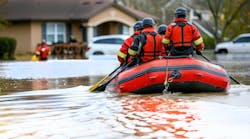Historic Flood in North Carolina Leaves Dozens Dead, Many Missing
The Charlotte Observer
(TNS)
A long stretch of Swannanoa is no more.
Businesses and homes along the Swannanoa River were reduced to rubble by Helene, which hit Florida as a Category 4 hurricane before it dumped historic rain totals in western North Carolina as a tropical storm. At least 30 people have died in Buncombe County alone, Sheriff Quentin Miller announced in an afternoon press briefing.
People in Swannanoa, a community east of Asheville along Interstate 40, scrambled for water, gas and other basic supplies this weekend. Help just began arriving Sunday from the National Guard and others from across the region.
Meanwhile, North Carolina received a major disaster declaration for 25 counties that will provide quicker help to those who need it. The federal government also says it will reimburse local governments, state agencies and nonprofits for repairs.
More from Hurricane Helene
- Two Circle, SC, Firefighters Killed in Hurricane Helene Identified
- Blackshear, GA, Assistant Chief Killed when Tree Falls on Truck Cab
- Three San Diego Firefighters Headed to Help with Hurricane Hurt in Crash
- Waycross, GA, Fire Station Damaged by Hurricane Helene
- People Rescued from Roof of Unicoi County, TN, Hospital
- Stranded in NC Mountains, Colerain Township, OH, Firefighter Rescued Residents
- Water Rescues Conducted Throughout the South as Hurricane Helene Hits
- USAR Teams Headed to Florida to Await Hurricane
Rescue workers will navigate their way through a maze of impassible roads and debris caused by Helene. Roads became rivers. Lakes filled with debris. And in many communities, there’s just nothing left.
The situation is dire. Many of North Carolina communities haven’t had fresh water, internet or cell service for multiple days.
“It seems like there would be more people here by now,” said Dustin Ebert, whose home is about 200 yards away from the main stretch of road that got destroyed in Swannanoa.
His floors got flooded, and he has three kids in the house. Around him, the roads were covered in dirt and dark mud. Old U.S. Highway 70 was fragmented and broken apart, much of it landing in the ravine below.
“But you know: What else can you do?” he asked.
Help wasn’t coming, he was certain.
“Where is FEMA at when we need it?” Angela McGee asked as she walked along that road while searching for her mobile home that wound up far from its usual spot.
McGee said she heard about a mandatory evacuation late, and she’s currently living with her kids in her car.
”We are down here in a disaster and no one is helping us out,” she said.
She wants more than a federal agency to show up. She needs water, cell service, shelters and food. Everything she’s learned has been through word of mouth, and she’s “infuriated,” she said.
For about a year Shemsuddin Millard prepped to open Black Mountain Improvisational Theater next door to Swannanoa. In another two months, he could’ve started lessons and workshops for people who want to do unscripted theater.
The question for him as he stood by his destroyed hopes: what’s next?
“Maybe the hard part is hoping that there’s some sort of lifeline and wondering if that’s there, but then kind of being faced with the reality that: No, there is not,” he said. “Might as well just f—ing laugh about it. Because, you know, what else is there? I already cried.”
NC National Guard
National Guard humvees started to roll through Black Mountain and Swannanoa on Sunday. Helicopters buzzed by every so often. A slew of law enforcement agencies and the National Guard handed out water bottles at an Ingles in Black Mountain. The grocery store’s lot was filled.
Atlantic Beach Fire Department Deputy Chief Casey Arthur was “clearing” a van that had fallen into the river with some National Guardsmen in Swannanoa early Sunday afternoon, “making sure nothing’s inside.”
They’d finish that job and keep moving down the river, he said. Searches started to taper off as cellphone service returned in spurts in corners of the county.
“These guys in Swannanoa have been running constantly,” he said.
Western NC cell phone service
Not being able to call others has been among the biggest problems for survivors. Panicked family members can’t reach their loved ones in communities devastated by the storm.
Families wondered: Are they alive?
Karen Morris worried about a relative in the county who needed to be cared for at home. She got a text Sunday morning: that relative had no power, no water and her oxygen was no longer working.
“We tried to get (family) to get ahold of 911,” Morris said. “We don’t know yet whether they were able to do that.”
Gov. Roy Cooper said during an interview on CNN Sunday that families who can’t reach their loved ones can contact North Carolina’s 211 service to ask for a welfare check. The United Way, which operated the service, also has a form on its website to request one.
©2024 The Charlotte Observer. Visit charlotteobserver.com. Distributed by Tribune Content Agency, LLC.




